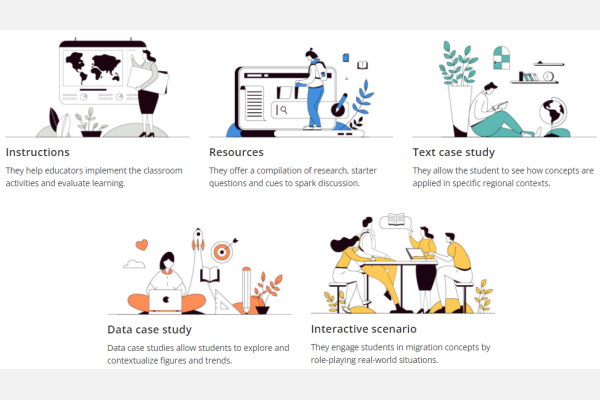Repository of Practices

World Migration Educators’ Toolkit
Dates
Type of practice
Geographic scope
Geographic Scope:
Summary
To support teachers across the world, IOM has also developed (in collaboration with the International Baccalaureate) the World Migration Educators' Toolkit to assist educators in their work to provide young adults with an understanding of the essentials of migration through 11 flexible modules. The Toolkit draws upon the extensive research and analysis in the World Migration Report series, the flagship publication of the International Organization for Migration (IOM), to deliver specialized tools and resources for use by key audiences, such as educators. Through the Toolkit classrooms are able to engage critically on crucial themes related to population movement, demographic change and the drivers of migration, displacement and mobility. An interactive digital toolkit, to supplement the PDF version, was launched on 30 March 2022.
Organizations
Main Implementing Organization(s)
Detailed Information
Benefit and Impact
The toolkit contributes to Sustainable Development Goal (SDG) 4 on education, particularly target 4.7 to “ensure that all learners acquire the knowledge and skills needed to promote sustainable development…”. It also contributes to objective 3 of the Global Compact for Migration (GCM), providing accurate and timely information on migration to both educators and students. A toolkit such as this is especially timely, given the significance of international migration and the need for balanced and accurate information to counter disinformation about migration and migrants.
Key Lessons
- Developing the World Migration Educators’ digital platform required coordination across three entities in different time-zones, which was initially time-consuming. An iterative approach involving close collaboration between the IOM research division, IOM online communications unit, and an external data visualization expert were essential for the success and sustainability of the project.
Recommendations(if the practice is to be replicated)
Innovation
Additional Resources
Additional Images
Date submitted:
Disclaimer: The content of this practice reflects the views of the implementers and does not necessarily reflect the views of the United Nations, the United Nations Network on Migration, and its members.
More Related Practices:
- Strengthening the capacities and frameworks to collect data and evidence on migration, the environment and climate change (MECC) in Mexico
- Disaggregated Data Action Plan (DDAP) - Statistics Canada
- Immigration, Refugees, and Citizenship Canada’s Use of Gender Based Analysis Plus (GBA Plus)
- Tablero Interactivo Estadísticas sobre Movilidad y Migración Internacional en México
- International Labour Migration Statistics (ILMS) Database in the Association of Southeast Asian Nations (ASEAN) region
Peer Reviewer Feedback:
*References to Kosovo shall be understood to be in the context of United Nations Security Council resolution 1244 (1999).
Newsletter
Subscribe to our newsletter.
